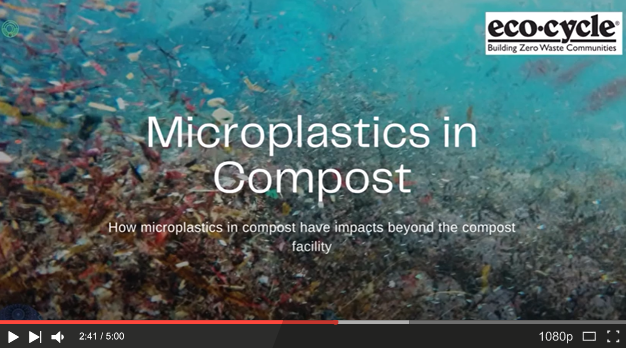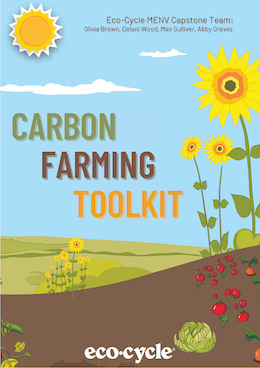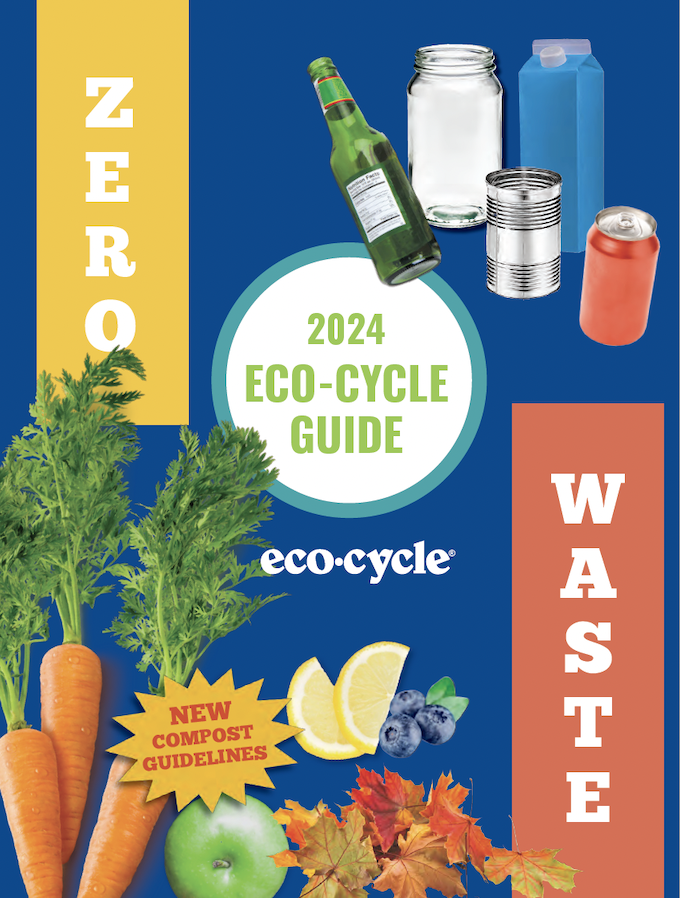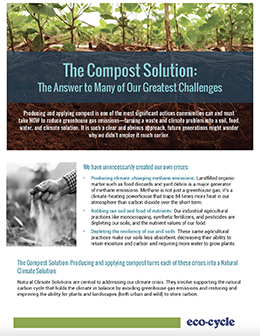Compost is a priority for climate, soil health, and water conservation.
Eco-Cycle’s compost program mission is to demonstrate and promote composting and carbon farming as a critical climate solution by developing a comprehensive Circular Community Compost System in Boulder County to serve as a model, and contribute to a robust statewide compost system across Colorado.
Eco-Cycle has identified this as one of our priorities because it is one of the most significant actions communities can and must take NOW to reduce greenhouse gas emissions, and turn a waste and climate problem into a soil, food, water, and climate solution.
Creating a Circular Community Compost System in Boulder County is a climate solution:
- Landfilled food and yard waste is a major generator of methane emissions. Methane is not just a greenhouse gas; it’s a climate-heating powerhouse that traps 84 times more heat in our atmosphere than carbon dioxide over the short term. Keeping organics out of the landfill prevents these emissions. Local compost infrastructure would improve access to affordable collection of compostable materials, which is expected to increase the amount of organic material diverted from the landfill by 44%.
- Using that finished compost on agricultural and urban lands can increase the ability of healthy soils and plants to pull even more carbon dioxide out of the atmosphere—REVERSING climate change. It’s called “carbon farming.”
For the potential of carbon farming on agricultural and urban lands to be fully realized, we must create a model Community Compost System based on Circular Economy principles that engages every sector of a community to:
- Generate clean organic discards for composting. We are committed to helping Boulder County residents and businesses understand that their organic discards become the very compost THEY can use on their own growing spaces, so making sure they provide only the good stuff (food and yard debris) and NONE of the bad stuff (plastic, aluminum, Styrofoam, etc.) will be key to a successful system.
- Build local compost infrastructure. Boulder County is committed to composting, with many communities within the county providing compost collection services, but emission-spewing trucks are now traveling 100 miles round-trip to the nearest compost facility. The goal of establishing a new facility within the county is to cut those transportation emissions to a fraction and to make local compost available to farmers and residents.
- Use compost on agricultural and urban lands to build soil, save water, sequester carbon, and build community resilience to climate change. For farming to be part of the climate solution we desperately need, new models are necessary—ones that reward farmers for building soil. We need to make compost available to “carbon farmers” (and backyard gardeners) at a cost that is competitive with their cost to spread synthetic fertilizers.
How a Local, Community-Owned Facility Helps Boulder County Reach Its Zero Waste Goals
In 2001 (funded by a tax passed in 1994), Boulder County built its own recycling facility to help the community reach its recycling goals. It’s time to do the same to help us reach our compost goals. More than 40% of the waste stream from county residents and businesses is compostable. According to an analysis done as part of the county’s evaluation process, the proximity of this site and the expected resulting cost savings for generators and haulers will attract an additional 18,500 tons of organic waste that is currently going to the landfill. This represents a 44% increase over the roughly 42,000 tons currently collected.
Demonstrating a Distributed Composting System
In response to recent backlash against Boulder County’s proposed centralized compost facility, Eco-Cycle sees a need to share the vision with pilot demonstrations that help us all understand and experience firsthand what is possible for our community.
The issue is not about waste management and making discards “go away”; it’s about recognizing that food and yard waste are land regeneration resources we want to keep local so we can rebuild our own degraded topsoil. The most direct way to do this is by implementing on-farm composting and using that compost to build healthy soils that sequester carbon and grow more nutritious food.
A Model We Can See for Ourselves: On-Farm Demonstrations and End Uses
Eco-Cycle is partnering with regenerative farmers in Boulder County to create on-farm compost demonstrations making finished compost as well as on-farm carbon farming demonstrations using finished compost (in some cases, these may be the same farms). The compost operations will use simple on-farm versions of the same state-of-the-art composting technology that was proposed for a county facility so that decision makers, regulators, farmers, neighbors, and the public can all experience a true circular compost system for themselves.
What It Will Take
By providing funding to assist with equipment procurement, training, and permitting, compost-making demonstration projects will empower farmers to make their own compost on-farm, for their own use. Eco-Cycle is seeking support funds for Aerated Static Pile (ASP) composting equipment and installation costs as well as a week-long operator training for participating farmers by the US Composting Council.
Demonstration projects utilizing finished compost for carbon farming will require access to a compost spreader and screen, or purchase of such equipment for joint use by multiple farmers. Eco-Cycle is exploring use of existing machinery, but if purchase is required, we are seeking support funds for these expenses as well.
Education, outreach, and tours are an essential aspect of all demonstration projects. Seeing a farmer make and use compost from local organic waste materials enables a person to understand how a circular compost system works and why it’s so important—building the necessary public support and engagement for long-term success. We will be working with local farmers to provide guided tours with interpretive signs on their farms that will give visitors the chance to see (and smell!) what a real compost solution is like. We will also be working to produce high-quality video and other communications tools to share the experience broadly.
Join us!
There are many ways you can be part of this important work!
- Support the program financially: Eco-Cycle needs funding for equipment procurement, training, permitting, and education. Reach out to us to learn more about the specific funding requirements, or donate directly to this program.
- Provide an on-farm location: Do you have a property you’d like to use as a demonstration? Let us know!
- Host a presentation: Are you part of a community group? We’ll come share the vision with you.
- Participate in the next phase of our carbon farming campaign: In 2021, Eco-Cycle concluded a three-year study of carbon farming in backyards. Now we’re taking it to the next level by using compost and other regenerative farming practices to sequester carbon while also planting trees to build the urban canopy (particularly in Boulder, which has been hard-hit by emerald ash borer), and plant pollinator gardens. Learn more about the Cool Boulder Campaign and sign up!
- Create a carbon farming campaign in your community! Use our toolkit developed from our three-year urban lands carbon farming pilot.




























